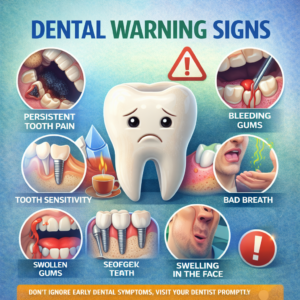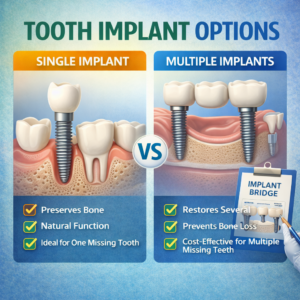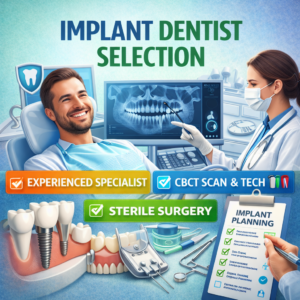Dietitian for Oral Health Salt Lake: The Role of Diet Consultation
Oral health is not just about brushing and flossing—it’s deeply connected to what we eat. A Dietitian for oral health Salt Lake can help patients make better dietary choices that strengthen teeth, prevent gum disease, and reduce the risk of cavities. Research shows that poor diet contributes to nearly 92% of dental caries globally (WHO). This makes diet consultation for oral health an essential part of dental care.
Nutrition and Oral Health: Why Diet Matters
The foods and drinks you consume directly affect your teeth and gums. Essential nutrients such as:
- Calcium and Vitamin D: Strengthen teeth and bones.
- Vitamin C: Prevents gum disease and promotes healing.
- Phosphorus and Magnesium: Support enamel strength.
On the other hand, sugary snacks, carbonated beverages, and acidic foods can lead to cavities, enamel erosion, and gum inflammation. That’s why nutrition and dental disease prevention must go hand in hand.
Recent research highlights that nutrition plays a critical role in dental health and disease prevention. A detailed study published in Nature explores how dietary habits directly impact oral diseases, reinforcing the need for proper diet consultation.
Common Nutritional Deficiencies That Harm Oral Health
Many dental issues can be traced back to poor nutrition. Some common deficiencies include:
- Vitamin C Deficiency → Gum bleeding and periodontal disease.
- Calcium Deficiency → Weaker teeth and bone loss.
- Protein Deficiency → Delayed healing after dental procedures.
- Vitamin A Deficiency → Reduced saliva production leading to dry mouth.
Regular diet consultation for oral health ensures that patients get tailored advice to overcome these deficiencies.
The Role of a Dietitian in Oral Health
A Dietitian for oral health Salt Lake works alongside dentists to develop personalized nutrition plans. Their role includes:
- Assessing eating habits and identifying risk factors.
- Designing a diet for healthy teeth and gums based on age, medical history, and lifestyle.
- Providing smile-friendly diet tips for everyday routines.
- Supporting patients with special conditions (diabetes, orthodontic care, or recurrent cavities).
This personalized approach goes beyond generic advice, making nutrition a proactive tool for nutrition and dental disease prevention.
Explore how nutrition supports the prevention of complex dental conditions like hypophosphatasia.
Foods That Support Healthy Teeth and Gums
A balanced diet helps maintain strong teeth and gums. Some top foods include:
- Dairy Products (milk, cheese, yogurt): High in calcium and casein, which protect enamel.
- Leafy Greens (spinach, kale): Rich in calcium and folic acid for gum health.
- Crunchy Fruits & Veggies (apples, carrots, celery): Help clean plaque and stimulate saliva.
- Nuts & Seeds (almonds, chia seeds): Provide essential minerals like magnesium and phosphorus.
- Green Tea & Water with Fluoride: Strengthen enamel and wash away bacteria.
These food choices align with expert smile-friendly diet tips and form the basis of a diet for healthy teeth and gums.
Foods and Habits to Avoid for Better Oral Health
To prevent cavities and gum disease, it’s important to limit or avoid:
- Sugary Foods & Drinks: Leading cause of cavities.
- Sticky Snacks (candies, dried fruits): Stay longer on teeth surfaces.
- Acidic Beverages (soda, citrus juices): Erode enamel over time.
- Excessive Alcohol: Reduces saliva production.
- Frequent Snacking: Increases acid attacks on teeth.
Diet consultation for oral health helps individuals develop strategies to replace harmful foods with healthier alternatives.
Smile-Friendly Diet Tips from Experts
- Drink plenty of water after meals to rinse acids.
- Choose sugar-free gum to stimulate saliva.
- Replace soda with herbal teas or infused water.
- Plan balanced meals to reduce frequent snacking.
- Eat crunchy fruits as natural cleansers after meals.
Such practical guidance from a Dietitian for oral health Salt Lake makes it easier to adopt lifelong habits for better oral health.
When to Seek Diet Consultation for Oral Health
You may benefit from seeing a dietitian if you:
- Suffer from frequent cavities despite good oral hygiene.
- Have gum disease or receding gums.
- Are undergoing orthodontic treatment.
- Have conditions like diabetes that impact oral health.
- Want a diet for healthy teeth and gums to protect your smile long-term.
Nutrition plays a vital role in maintaining oral health. A Dietitian for oral health Salt Lake can create personalized nutrition strategies that prevent dental disease, strengthen teeth, and promote a confident smile. With expert diet consultation for oral health, patients can follow smile-friendly diet tips and make better food choices that keep cavities at bay.
FAQs
Q1. Can a dietitian really help with oral health?
Yes, a dietitian provides customized plans that support strong teeth, healthy gums, and cavity prevention.
Q2. What are the best foods to prevent cavities?
Dairy products, leafy greens, crunchy vegetables, nuts, and fluoride-rich water are excellent foods to prevent cavities.
Q3. Is sugar-free gum good for oral health?
Yes, chewing sugar-free gum increases saliva flow, which helps neutralize acids and protect teeth.
Q4. How often should I consult a dietitian for oral health?
It’s recommended to seek diet consultation for oral health annually or if you notice frequent dental issues.
Q5. Are natural remedies enough to prevent dental disease?
While natural foods help, professional consultation ensures a complete nutrition and dental disease prevention plan tailored to your needs.





